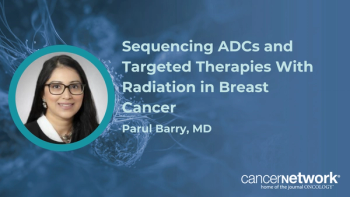
Oncology NEWS International
- Oncology NEWS International Vol 5 No 5
- Volume 5
- Issue 5
Peto Explores Latest Metaanalysis of Early Breast Cancer Trials
PARIS--New analyses from the mega-databank of the Early Breast Cancer Trialists' Collaborative Group (EBCTCG) have confirmed that both ovarian ablation and polychemotherapy make a small but real difference in survival, Professor Richard Peto, of the University of Oxford's ICRF Clinical Trial Service Unit, said at the Sixth International Congress on Anti-Cancer Treatment (ICACT).
PARIS--New analyses from the mega-databank of the Early BreastCancer Trialists' Collaborative Group (EBCTCG) have confirmedthat both ovarian ablation and polychemotherapy make a small butreal difference in survival, Professor Richard Peto, of the Universityof Oxford's ICRF Clinical Trial Service Unit, said at the SixthInternational Congress on Anti-Cancer Treatment (ICACT).
Previous reports from this overview of 200 trials involving 100,000women have spotlighted a similar benefit with tamoxifen (Nolvadex),but have found no survival advantages for adjuvant radiotherapyvs no radiotherapy or for mastectomy vs breast-conserving surgery.
Speaking on behalf of the EBCTCG, Professor Peto said that 10-yearoverall survival was 60.6% for breast cancer patients under theage of 50 who had undergone ovarian ablation, as compared with56.2% for those who had not. This difference was maintained forup to 15 years, when overall survival was 52.9% with ovarian ablationvs 47.4% without (P = .004).
"The differences in recurrence-free survival were even moredefinite, so the idea that breast cancer in women under 50 isnot sensitive to hormone therapy just isn't true," he said."It's not a large difference, but it's as big as the effectof streptokinase and aspirin in reducing mortality after myocardialinfarction."
A 5% edge in overall survival also emerged for patients who hadbeen treated with multiple chemotherapeutic agents, relative tothose who had not received polychemotherapy. Professor Peto saidthat this benefit was independent of the particular multiple chemotherapeuticregimen used.
"You can actually get double the benefit by using doubletreatment," he continued, noting that chemotherapy combinedwith tamoxifen yielded better results than either approach usedalone.
[Editors' Note: Professor Peto's report on the latest EBCTCG metaanalysisof tamoxifen trials appeared on page 1 of the January, 1996, issueof Oncology News International.]
Articles in this issue
almost 30 years ago
No Need to Delay Mammography After FNA, Study Showsalmost 30 years ago
Pediatric Cancer Guidelines Are a National Effortalmost 30 years ago
EPA Proposes Changes in Determining Cancer Risk of Chemicals, Pollutantsalmost 30 years ago
ATL's HDI Digital Ultrasound Is Approved for Breast Indicationalmost 30 years ago
NIH Study Suggests That 200 mg Is The Optimal Daily Dose of Vitamin Calmost 30 years ago
Natural History of HIV Supports the Use Of Early Interventionsalmost 30 years ago
Aids Vaccine Trial Fails to Show Clinical Benefitalmost 30 years ago
Rep. Porter Honored For Work on BudgetNewsletter
Stay up to date on recent advances in the multidisciplinary approach to cancer.






































